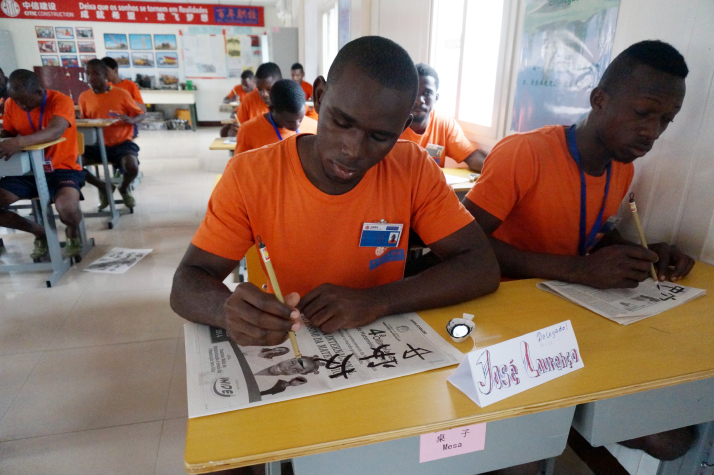|
||||||||||
| Home Nation World Business Opinion Lifestyle ChinAfrica Multimedia Columnists Documents Special Reports |
|
||||||||||
| Home Nation World Business Opinion Lifestyle ChinAfrica Multimedia Columnists Documents Special Reports |
| ChinAfrica |
| Empowering the Disadvantaged |
| A vocational training school in Angola, funded by a Chinese company, offers opportunities for young disadvantaged people |
| By Li Xiaoyu | VOL.11 November ·2019-11-18 |

Civil engineering students at CITIC BN Vocational School in Angola (COURTESY PHOTO)
The heat of Luanda, the capital of Angola, is stifling during the rainy season. However, José Lourenço, 26, is in a light mood. He just finished his day's work and sat down in the yard of the school where he lives, studies and works since 2014.
Born into a poor family, José has six brothers and sisters. Five years ago, because he could not afford school fees, he had to drop out of high school, despite excellent grades. Without a diploma or qualification, José had to sell drinks on the roadside for a living.
But when the CITIC BN Vocational School (Angola) opened its doors, especially for students from underprivileged families, José saw a new hope. Inaugurated in Kilamba City in Luanda in May 2014, it offers three types of training: electrical engineering, mechanics and masonry.
Besides covering all the tuition fees, the school has also established partnerships with different companies that allow students to obtain internships and a guaranteed job after graduation. For José, the opportunity is a blessing, a sign of good luck. Without hesitation, the young man took and passed the entrance exam. He is one of graduates of the first class in mechanics at the vocational school.
After his graduation, José was employed by the school to teach computer courses. His salary is an invaluable support for his family because in Angola, there are many young people who, like José, have to give up studies due to lack of means. The establishment of this school is therefore a way out for a lot of them.
Engaged in education
Since 2007, CITIC Construction, a Chinese company, has contracted in public works in Angola. After a dozen years, the company has finished construction of 51,000 social housing units, and the Angolan employees reached 17,000 at the peak. But the company found that the workforce was too often poorly qualified and struggled to meet certain requirements. Despite the training provided by the company, there is still a lack of personnel with good education in the country.
In addition to its construction projects, CITIC Construction has therefore been engaged in projects for social benefits. "Unlike material donations, we believe that the investment in education is for the long-term good. With vocational training, young people can acquire expertise and gain competitiveness in the labor market," said Wang Guanxiong, the school's director. "We all know this proverb that when a man is hungry, it is better to teach him how to fish than to give him a fish. That's what we're trying to do here."
It is this spirit that led to the establishment of the school, in collaboration of CITIC Construction with the Foundation for the Development of Chinese Youth and the BN Vocational School (BNVS), especially under the guidance of Yao Li, Founder and Board Chairperson of BNVS, China's first tuition-free, non-profit charitable vocational school at the senior secondary level. On May 8, 2014, Chinese Premier Li Keqiang attended the inauguration ceremony of the vocational school in Angola. "You have practiced China's Project Hope in an African country by offering free technical training to young people from disadvantaged backgrounds. This project holds great promise for strengthening cultural exchanges between China and Africa," said Li.

José Lourenço (left) studies traditional Chinese calligraphy (COURTESY PHOTO)
From China to Angola
Established in Beijing in 2005, the BNVS is the first free vocational education institution in China. Present in 10 Chinese cities so far, its goal is to provide disadvantaged youth with quality educational resources. Today, this model has also been established in Angola.
The courses offered by the school are aimed at young people aged 16 to 25 from poor families. "We seek to equip our students with solid expertise and engage them in public interest activities with a spirit of collaboration," said Wang.
The school offers training in five areas: mechanical engineering, construction engineering, electrical engineering, computer science and hotel services. Also offered are classes on workplace etiquette, Portuguese, Chinese and English. Students are exempt from any charges, including accommodation, meals and tuition fees. Job opportunities are available to them once they graduate.
But the goal of the school is also to actively include Angolan teams in the program to instill more vivacity. Today, the 10 teachers of the school are all Angolans. "It facilitates understanding and communication between teachers and students. It is about respecting the customs of the country and integrating ourselves fully into the local culture," said Wang. In addition, all the diplomas of the school are delivered by the Center for Vocational Education and Training under the Angolan Ministry of Public Administration, Labor and Social Security.
An effective project
In five years, some 400 students have graduated. All were recruited by partner companies and now working in areas ranging from mechanical operation and construction engineering to administrative management.
On the occasion of the latest graduation ceremony this summer, Murtala Marta, Mayor of Kilamba, expressed his gratitude to CITIC Construction for setting up the vocational school. He encouraged new graduates to contribute to Angola's development and pledged to support the operation of the school.
In the short- and medium-term, the school wishes to move from teaching by local teams to school management by local teams. "Of course, we want Angolan educators manage the school on their own, so that it can anchor itself deep in the local social fabric," noted Wang. In addition, school officials envision the school as a platform for communication between two cultures. "We try to get more financial and political support, as well as educational resources, especially from local businesses. This will allow us to strengthen our capacities, and improve the quality of our teaching," he added.
José, meanwhile, is confident that his efforts will be rewarded. In his free time, the young man studies computer engineering in evening classes. He also hopes to continue his studies in China. In a burst of laughter, he concluded with determination: "Yes, for the future of my country, for my future, I am ready to learn Chinese!"
(Comments to lixiaoyu@chinafrica.cn)
|
||||||||||||
| About Us | Contact Us | Advertise with Us | Subscribe |
| Copyright Beijing Review All rights reserved 京ICP备08005356号-5 京公网安备110102005860号 |